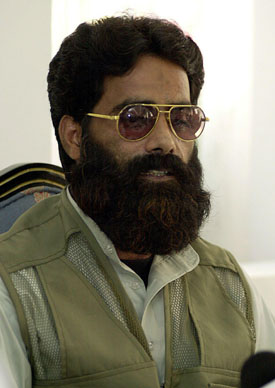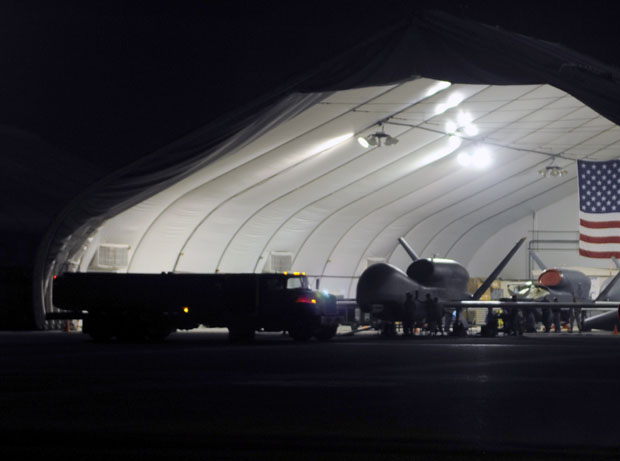Taliban anger over death of Ilyas Kashmiri
Pakistan Taliban leaders warn Channel 4 News that their fighters will seek to avenge the death of their leader, Ilyas Kashmiri, upon Pakistan and US targets.

The dreaded Pakistani militant commander and leader of Harkatul Jihad-e-Islami (HuJI), Ilyas Kashmiri, was killed along with 13 other militants in a US drone attack at a village near Wana, South Waziristan, on Friday night.
He was wanted to Pakistan, the United States and several other countries for his alleged involvement in several terrorist attacks.
The United States had recently offered a $5 million bounty for information leading to his location. He was one of the five most wanted militant leaders in the list, which the United States had reportedly given to Pakistan recently.
The list included al-Qaeda chief Dr Ayman al-Zawahiri, Atiya Abdul Rahman, the Libyan operations chief of al-Qaeda, Afghan Taliban leader Mulla Mohammad Omar, Commander Sirajuddin Haqqani, operational chief of the Haqqani network.
Western media has recently projected Ilyas Kashmiri and described him “the next Osama bin Laden” which had even surprised Kashmiri himself and his fighters engaged in fight against US-led NATO forces in Afghanistan.
Some observers said the United States had told Pakistani leadership that the list was a test of whether Pakistan was serious in fighting and eliminating terrorists reportedly based in the country’s lawless tribal areas along the border with Afghanistan.
Senior Punjabi Taliban commanders and close aides to the top Pakistani militant leader confirmed the killing of Ilyas Kashmiri in the US drone attack and warned they would avenge the “martyrdom” of their “Ameer” from the United States and Pakistan.
One of these commanders Qari Mohammad Idrees, confirmed his death in the US drone strikes.

He said Ilyas Kashmiri was based in North Waziristan but moved to Wana, the regional headquarters of South Waziristan, a few days ago on the advice of his well-wishers after rumours that the Pakistan government was planning to launch a military operation in North Waziristan.
“We lost our hero finally. He was the hero of Islam, Kashmir and Afghanistan,” Qari Idrees remarked in his broken voice.
He said Ilyas Kashmiri, 47-plus, was sitting with friends at an apple orchard when came under attack.
The CIA-operated spy plane, he said, first fired two missiles and hit the same place where the militant commander and his men were sitting.
With an interval of a few minutes, he said, the drone fired two more missiles and again hit their bodies, which and blew them to pieces.
The militant commander said that besides Ilyas Kashmiri, 13 other people, most of them hailing from various areas in Punjab such as Dera Ghazi Khan, Faisalabad, Lahore and Jhang were killed in the attack.
Some of the slain people were identified as Ameer Hamza, Mohammad Ibrahim, Mohammad Usman, Mohammad Nauman, Farooq Ahmad, Qari Abdul Qadoos and Mohammad Imran.
He said some of the slain men had been buried at a graveyard near Ghundai village in Wana, but showed reluctance to provide information when asked whether Ilyas Kashmir had also been laid to rest at the same graveyard.
Qari Idrees said Kashmiri had taken part in Afghan Jihad against the Soviet occupation army and lost his two eyes and three fingers of his right hand in an explosion. However, he said, later his right eyesight was restored through a donated eye brought from Sri Lanka.
He said Kashmiri was associated with Afghan Taliban and Arabs and engaged in the fight against the US-led occupation forces in Afghanistan’s Khost, Paktia, Paktika and Helmand provinces.
Another senior militant commander of the Punjabi Taliban and an active member of Harkatul Jihad-e-Islami also confirmed Kashmiri’s death in the drone attack.
Seemingly shocked over the loss of their leader, the militant commander, who wished not to be named, said that Ilyas Kashmiri and his men had never been involved in any terror incidents in Pakistan.
“Ilyas Kashmiri had always opposed carrying out terrorist acts in Pakistan. We have no involvement in any attack in Pakistan whether it was the attack on GHQ or Pakistan Navy’s Mehran base in Karachi,” the militant leader claimed.
However, he feared that now when Ilyas Kashmiri is dead, it would be difficult for the leadership he left behind to control the angry and shocked fighters from carrying out attacks inside Pakistan.
“I have been witness to several occasions when Pakistani militant commanders of banned Jihadi organisation have tried to provoke him for allowing his men to fight against Pakistani security forces, as they were arresting and killing his fighters and then cooperating with the Americans to eliminate him through their unmanned spy planes.
“But Kashmiri Sahib would always turn down their suggestions and would tell them that Pakistan was a fortress of Islam and home of the brave Muslims,” the militant commander recalled.

A U.S. Air Force RQ-4 Global Hawk drone aircraft assigned to the 380th Air Expeditionary Wing is being refueled during operations on the flight line of an undisclosed base in Southwest Asia in this file image from January 10, 2010. (Reuters)
-
Latest news
-
Boy with profound learning disabilities reaches out of court settlement after abuse in residential school7m

-
India election: Modi rivals hit by string of raids and arrests7m

-
Can UK’s abandoned mines be used to build a greener future?5m

-
Sycamore Gap: Man pleads not guilty to felling iconic tree2m

-
‘Child poverty has not fallen since Tories came in’, says Gordon Brown5m

-





